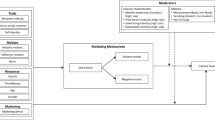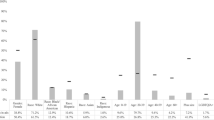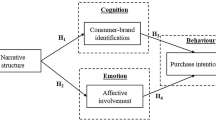Abstract
The literature has long acknowledged the impact of stereotypical associations with a product’s country of origin (COO) on consumers’ cognitive assessments of the product. However, consumers’ emotional reactions to a product’s COO can also influence their decisions. For example, the literature reports a monotonically negative relationship between consumer animosity (CA) and the purchase of products from an animosity-evoking country. The literature provides an incomplete picture though because it does not consider other factors that may transform this negative relationship. Drawing on theories of the interplay between affect and cognition in decision-making, this research investigates the nuanced interaction between CA and product country image (PCI). Using samples from the United States, China, Japan, and South Korea, we find that the monotonically negative impact of CA holds only when the target country’s PCI is unfavorable. When PCI is favorable, we find an inverted U-shaped relationship between CA and purchase intentions – that is, CA has a positive effect on purchase intention as it increases from low to moderate levels and a negative effect as its magnitude escalates beyond a threshold. These findings offer new insights to address the complexity of market entry modes, segmentation, targeting, positioning, and communication decisions in international markets.
Résumé
La littérature reconnaît depuis longtemps l'impact des associations stéréotypées avec le pays d'origine d'un produit sur l'évaluation cognitive du produit par les consommateurs. Néanmoins, les réactions émotionnelles de ces derniers au pays d'origine d'un produit peuvent également influencer leurs décisions. Par exemple, la littérature fait état d’une relation négative monotone entre l'animosité des consommateurs (Consumer Animosity-CA) et l'achat de produits provenant d'un pays suscitant l'animosité. La littérature apporte pourtant une image incomplète, car elle ne tient pas compte d'autres facteurs susceptibles de transformer cette relation négative. S'appuyant sur les théories de l'interaction entre l'affectivité et la cognition dans la prise de décision, cette recherche étudie l'interaction nuancée entre la CA et l'image du pays du produit (Product Country Image-PCI). Sur la base d’échantillons provenant des États-Unis, de la Chine, du Japon et de la Corée du Sud, nous constatons que l'impact négatif monotone de la CA ne se maintient que lorsque la PCI du pays cible est défavorable. Lorsque la PCI est favorable, nous observons une relation en forme de U inversé entre la CA et les intentions d'achat, c'est-à-dire que la CA a un impact positif sur les intentions d'achat lorsqu'elle passe d'un niveau faible à un niveau modéré, et qu’elle a un impact négatif lorsque son ampleur dépasse un seuil. Ces résultats apportent de nouveaux renseignements pour aborder la complexité des modes d'entrée sur les marchés, la segmentation, le ciblage, le positionnement et les décisions de communication sur les marchés internationaux.
Resumen
Por mucho tiempo la bibliografía ha reconocido el impacto de las asociaciones estereotípicas con el país de origen (COO por sus iniciales en inglés) en la evaluación cognitiva de los consumidores sobre los productos. Sin embargo, las reacciones emocionales de los consumidores al país de origen de un producto también pueden influenciar sus decisiones. Por ejemplo, la bibliografía reporta una relación monotónica negativa entre la aversión del consumidor y la compra de productos de un país que le evoca aversión. Pese a esto, la bibliografía provee una imagen incompleta, debido a que no considera otros factores que pueden transformar esta relación negativa. Basándose en las teorías de la interacción entre el efecto y la cognición en la toma de decisiones, esta investigación indaga los matices de la interacción entre la aversión del consumidor y la imagen del país del producto. Utilizando muestras de los Estados Unidos, China, Japón y Corea del Sur, encontramos que el impacto monotónico negativo de la aversión del consumidor se mantiene solo cuando la imagen del país del producto es desfavorable. Cuando la imagen del país del producto es favorable, encontramos una relación en forma de U entre la aversión del consumidor y las intenciones de compra, es decir, la aversión del consumidor tiene un efecto positivo en la intención de compra a medida que aumenta de niveles bajo a moderado y un efecto negativo a medida que su magnitud aumenta más allá del umbral. Estos hallazgos ofrecen nuevas perspectivas para abordar la complejidad de los modos de entrada en el mercado, la segmentación, el objetivo, el posicionamiento y las decisiones de comunicación en los mercados internacionales.
Resumo
A literatura há muito reconhece o impacto de associações estereotipadas com o país de origem de um produto (COO) nas avaliações cognitivas dos consumidores sobre o produto. No entanto, as reações emocionais dos consumidores ao COO de um produto também podem influenciar suas decisões. Por exemplo, a literatura relata uma relação monotonicamente negativa entre a animosidade do consumidor (CA) e a compra de produtos de um país que evoca a animosidade. No entanto, a literatura fornece um quadro incompleto, já que desconsidera outros fatores que possam transformar essa relação negativa. Baseando-se em teorias da interação entre afeto e cognição na tomada de decisão, esta pesquisa investiga a sutil interação entre CA e imagem do país do produto (PCI). Usando amostras dos Estados Unidos, China, Japão e Coreia do Sul, descobrimos que o impacto monotonicamente negativo de CA se mantém apenas quando o PCI do país-alvo é desfavorável. Quando a PCI é favorável, encontramos uma relação em forma de U invertido entre CA e intenções de compra – ou seja, CA tem um efeito positivo na intenção de compra quando ela aumenta de níveis baixos a moderados e um efeito negativo quando sua magnitude aumenta além de um limite. Essas descobertas oferecem novos insights para abordar a complexidade de modos de entrada no mercado, segmentação, direcionamento, posicionamento e decisões de comunicação nos mercados internacionais.
摘要
长期以来, 大量文献都承认消费者对产品原产国 (COO) 的刻板关联对消费者的产品认知评估有影响。然而, 消费者对产品COO的情绪反应也会影响他们的购买决定。例如, 文献报道了消费者敌意 (CA) 与从引起敌意的国家购买产品之间的单调负相关关系。然而, 文献提供了一个不完整的画面, 因为它没有考虑可能转变这种负面关系的其它因素。本研究借鉴决策中的情感与认知之间相互作用的理论, 调查了CA 与产品国家形象 (PCI) 之间的细微互动。我们使用美国、中国、日本和韩国的样本, 发现只有当目标国家的 PCI 不利时, CA 的单调负面影响才成立。当 PCI 有利时, 我们发现 CA 与购买意愿之间存在倒 U 型关系——也就是说, 当CA从低水平增加到中等水平时其对购买意愿有积极影响, 而当其幅度升级超过阈值时, 则有负面影响。这些发现为解决国际市场中的市场进入模式、市场细分、目标选定、定位和沟通决策的复杂性提供了新的见解。


Similar content being viewed by others
REFERENCES
Aditya, A. 2020. Indian bans more than 200 Chinese Apps in fiscal year 2020, Business World. http://bwdisrupt.businessworld.in/article/Indian-bans-more-than-200-Chinese-apps-in-fiscal-year-2020/02-12-2020-349005/. Accessed 10 March 2021.
Aiken, L. S., West, S. G., & Reno, R. R. 1991. Multiple regression: Testing and interpreting interactions. Thousand Oaks, CA: Sage.
Bagozzi, R., Gopinath, M., & Nyer, P. 1999. The role of emotions in marketing. Journal of the Academy of Marketing Science, 27(2): 184–206.
Bahaee, M., & Pisani, M. J. 2009. Are Iranian consumers poised to “buy American” in a hostile bilateral environment? Business Horizons, 52(3): 223–232.
Balabanis, G., & Diamantopoulos, A. 2004. Domestic country bias, country-of-origin effects, and consumer ethnocentrism: A multidimensional unfolding approach. Journal of the Academy of Marketing Science, 32(1): 80–95.
Chosun Biz. 2017. Japanese cosmetics made great strides in China in the midst of THAAD crisis: Lesson for Korean companies about differentiation. https://biz.chosun.com/site/data/html_dir/2017/09/20/2017092000451.html. Accessed 8 March 2022 (in Korean).
Cui, A., Wajda, T. A., & Hu, M. Y. 2012. Consumer animosity and product choice: Might price make a difference? Journal of Consumer Marketing, 29(7): 494–506.
Dinner, I. M., Kushwaha, T., & Steenkamp, J.-B.E. 2019. Psychic distance and performance of MNCs during marketing crises. Journal of International Business Studies, 50(3): 339–364.
Haans, R. F., Pieters, C., & He, Z. L. 2016. Thinking about U: Theorizing and testing U- and inverted U-shaped relationships in strategy research. Strategic Management Journal, 37(7): 1177–1195.
Jiménez, N. H., & San Martín, S. 2010. The role of country-of-origin, ethnocentrism, and animosity in promoting consumer trust: The moderating role of familiarity. International Business Review, 19: 34–45.
Keltner, D., & Lerner, J. S. 2010. Emotion. In S. T. Fiske, D. T. Gilbert, & G. Lindzey (Eds.), Handbook of social psychology: 317–352. New York: Wiley.
Klein, J. G., Ettenson, R., & Morris, M. 1998. The animosity model of foreign product purchase: An empirical test in the People’s Republic of China. Journal of Marketing, 62(1): 89–100.
Lerner, F. S., Li, Y., Valdesolo, P., & Kassam, K. S. 2015. Emotion and decision making. Annual Review of Psychology, 66(1): 799–823.
Loewenstein, G. 1996. Out of control: Visceral influences on behavior. Organizational Behavior and Human Decision Processes, 65: 272–292.
Loewenstein, G., & Lerner, J. S. 2003. The role of affect in decision making. In R. J. Davidson, K. R. Scherer, & H. H. Goldsmith (Eds.), Handbook of affective sciences: 619–642. New York: Oxford University Press.
Luo, J., & Yu, R. 2015. Follow the heart or the head? The interactive influence model of emotion and cognition. Frontiers in Psychology, 6: 573.
Luo, Z., & Zhou, Y. 2020. Decomposing the effects of consumer boycotts: Evidence from the anti-Japanese demonstration in China. Empirical Economics, 58(6): 2615–2634.
Ma, J., Wang, S., & Hao, W. 2012. Does cultural similarity matter? Extending the animosity model from a new perspective. Journal of Consumer Marketing, 29(5): 319–332.
Mandler, G. 1982. The structure of value: Accounting for taste. In M. S. Clark, & S. T. Fiske (Eds.), Affect and cognition: The 17th annual Carnegie symposiumHillsdale, NJ: Erlbaum.
Meyers-Levy, J., & Tybout, A. M. 1989. Schema congruity as a basis for product evaluation. Journal of Consumer Research, 16(1): 39–54.
Pappu, R., Quester, P., & Cooksey, R. 2007. Country image and consumer-based brand equity: Relationships and implications for international marketing. Journal of International Business Studies., 38: 726–745.
Petty, R. E., & Cacioppo, J. T. 1986. The elaboration likelihood model of persuasion. Advances in Experimental Social Psychology, 19: 123–205.
Roth, M. S., & Romeo, J. B. 1992. Matching product category and country image perceptions: A framework for managing country-of-origin effects. Journal of International Business Studies, 23: 477–497.
Samiee, S. 1994. Customer evaluation of products in a global market. Journal of International Business Studies, 25: 579–604.
Samiee, S. 2010. Advancing the country image construct: A commentary essay. Journal of Business Research, 63(4): 442–445.
Samiee, S., Shimp, T., & Sharma, S. 2005. Brand origin recognition accuracy: Its antecedents and consumers’ cognitive limitations. Journal of International Business Studies, 36: 379–397.
Schwarz, N., & Bless, H. 1991. Happy and mindless, but sad and smart? The impact of affective states on analytic reasoning. In P. F. Joseph (Ed.), Emotion and social judgments: International series in experimental social psychology: 55–71. Oxford: Pergamon Press.
Schwarz, N., & Clore, G. L. 1983. Mood, misattribution, and judgements of well-being: Informative and directive functions of affective states. Journal of Personality and Social Psychology, 45(3): 513–523.
Srivastava, R. 2014. Impact of country of origin on Indian consumers-study of Chinese brands. Asian Journal of Marketing, 8(2): 54–70.
Verlegh, P. W., & Steenkamp, J.-B.E.M. 1999. A review and meta-analysis of country-of-origin research. Journal of Economic Psychology, 20(5): 521–546.
Wang, Y. 2020. Japan becomes most visited destination for Chinese tourists in 2019. CGTN. https://news.cgtn.com/news/2020-01-21/Japan-becomes-most-visited-destination-for-Chinese-tourists-in-2019-NqxVJOdzk4/index.html. Accessed 10 March 2021.
Zajonc, R. B. 1980. Feeling and thinking: Preferences need no inferences. American Psychologist, 35(2): 151–175.
Zajonc, R. B., & Markus, H. R. 1985. Must all affect be mediated by cognition? Journal of Consumer Research, 12: 363–364.
Author information
Authors and Affiliations
Corresponding authors
Additional information
Accepted by Saeed Samiee, Area Editor, 1 July 2022. This article has been with the authors for three revisions.
Publisher's Note
Springer Nature remains neutral with regard to jurisdictional claims in published maps and institutional affiliations.
Supplementary Information
Below is the link to the electronic supplementary material.
Rights and permissions
Springer Nature or its licensor holds exclusive rights to this article under a publishing agreement with the author(s) or other rightsholder(s); author self-archiving of the accepted manuscript version of this article is solely governed by the terms of such publishing agreement and applicable law.
About this article
Cite this article
Wang, S., Tang, Z., Stewart, D.W. et al. Interplay of consumer animosity and product country image in consumers’ purchase decisions. J Int Bus Stud 54, 505–513 (2023). https://doi.org/10.1057/s41267-022-00556-0
Received:
Revised:
Accepted:
Published:
Issue Date:
DOI: https://doi.org/10.1057/s41267-022-00556-0




